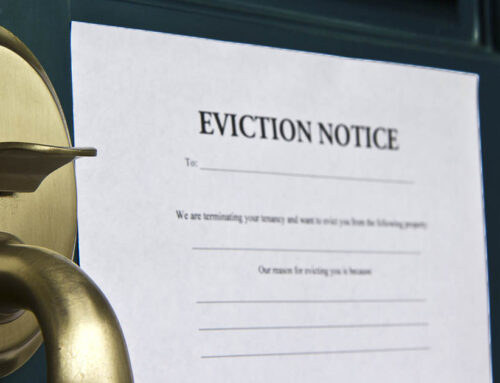The recent decision from the U.S. Bankruptcy Court for the Southern District of New York in In re Tony Ronell Cooper, Jr. provides a sharp reminder of the limitations of bankruptcy protection for debtors, particularly in eviction proceedings.
The court’s ruling underscores the strict application of the automatic stay provisions under 11 U.S.C. § 362, especially when debtors engage in serial bankruptcy filings without fully complying with the statutory requirements.
Beyond that, the decision provides a cautionary tale about the dangers of filing for bankruptcy without a lawyer.
Using Bankruptcy to Delay Eviction
Cooper’s dispute started when he stayed in his apartment after the lease expired. He then fell behind on rent, accruing a substantial debt of $9,913 by August 2023. Following legal action in the City Court of Poughkeepsie, the landlord secured a judgment for possession of the property and a monetary judgment of $14,724 in January 2024. A warrant of eviction was issued, and Cooper was served with a notice requiring him to vacate the premises by February 29, 2024.
Cooper filed three bankruptcy petitions to delay eviction between August 2023 and May 2024—two under Chapter 7 and one under Chapter 13. These petitions were dismissed due to procedural failures, including his inability to file required documentation on time.
These filings appeared to be timed to stall the landlord’s eviction efforts, raising concerns about bad faith filings. Ultimately, the court ruled that the automatic stay did not apply to the landlord’s eviction efforts and allowed the eviction to proceed.
The Impact of Repeated Bankruptcy Filings
The key legal issue in this case was whether the automatic stay applied to the landlord’s eviction proceedings. Cooper’s bankruptcy petitions triggered the automatic stay provision under 11 U.S.C. § 362(a), which generally halts eviction actions. However, an exception under 11 U.S.C. § 362(b)(22) allows eviction actions to proceed if the landlord has already obtained a judgment for possession before the bankruptcy filing.
Since the landlord had secured a judgment for possession in January 2024—before Cooper’s Chapter 13 filing—the court ruled that the automatic stay did not apply.
In addition, the court evaluated whether Cooper had met the criteria under 11 U.S.C. § 362(l) to temporarily halt the eviction by depositing rent and certifying that he could cure the default.
Cooper failed to make sufficient payments to meet the judgment amount, and the court found that he had not complied with the requirements under section 362(l).
The Dangers of Filing for Bankruptcy Without a Lawyer
One significant aspect of this case is that Cooper filed all three bankruptcy petitions without the assistance of an attorney.
Pro se bankruptcy filings are not uncommon, but they present unique challenges for debtors. Bankruptcy law is complex, and navigating its procedural and substantive requirements can be overwhelming for individuals without legal training. Cooper’s case highlights several critical errors that could have been avoided with professional legal guidance:
- Failure to File Required Documents: Cooper’s first two Chapter 7 petitions were dismissed because he did not file the necessary schedules and statements required under 11 U.S.C. § 521(a)(1). Bankruptcy courts require debtors to submit detailed financial documentation, including income, assets, and liabilities, to ensure transparency and fairness to creditors. Cooper’s failure to do so led to automatic dismissal under § 521(i)(1), which mandates dismissal if a debtor does not file all required documents within 45 days of the petition date.
- Misunderstanding the Automatic Stay and Its Exceptions: While the automatic stay is one of the most powerful tools in bankruptcy, its application is not absolute. Section 362(b)(22) explicitly excludes eviction actions where a landlord has already obtained a judgment for possession. Cooper, likely unaware of this exception, filed his petitions to stop the eviction, only to find that his filings did not protect him. A knowledgeable attorney would have been able to explain these limitations, potentially preventing Cooper from filing cases that were destined to fail.
- Inadequate Rent Payments Under Section 362(l): Cooper attempted to use the provision under 11 U.S.C. § 362(l) to temporarily halt the eviction by submitting a money order for $948—the monthly rent. However, section 362(l) requires the debtor to deposit sufficient funds to cover the entire monetary default leading to the eviction judgment, which in this case was $14,724. Even if Cooper had met the 30-day certification requirement, his rent deposits were far too small to satisfy the statutory obligation. An attorney would have ensured Cooper understood the financial requirements to halt the eviction.
How an Experienced Bankruptcy Attorney Could Have Helped
Filing for bankruptcy without legal assistance is risky, particularly for individuals unfamiliar with the nuances of the law. In Cooper’s case, hiring an experienced bankruptcy attorney could have changed the trajectory of his legal battles in several ways:
- Compliance with Procedural Requirements: Cooper’s most significant failure was his inability to file required documentation, leading to the automatic dismissal of his first two Chapter 7 petitions. An attorney would have guided Cooper through compiling and submitting the necessary schedules and financial statements, avoiding these procedural pitfalls.
- Realistic Assessment of Bankruptcy Options: Cooper’s decision to file successive petitions—each timed to delay the eviction—raised the court’s suspicion of bad faith filings. A bankruptcy attorney would have provided a more realistic assessment of his options, explaining that repeated filings would not halt the eviction once a judgment for possession had been entered. Instead, the attorney might have explored alternatives, such as negotiating a payment plan with the landlord or pursuing other avenues outside of bankruptcy.
- Understanding and Meeting the Requirements of Section 362(l): Cooper’s attempts to temporarily halt the eviction by depositing rent were inadequate because he did not understand that Section 362(l) required the complete cure of his monetary default. An attorney would have ensured Cooper was fully aware of these requirements and could have advised him on whether such a cure was financially feasible.
- Protecting Against Future Evictions: Finally, an experienced attorney could have crafted a strategic plan to resolve Cooper’s underlying financial issues, potentially allowing him to keep his residence or avoid future eviction proceedings. Rather than engaging in multiple filings that ultimately failed, Cooper could have developed a sustainable plan to address his debts.
Play By the Rules to Maximize the Benefits of Bankruptcy
Tony Ronell Cooper, Jr. is living proof of how the protections afforded by bankruptcy can be rendered ineffective when a debtor navigates the process without proper legal guidance. By filing multiple petitions without an attorney, Cooper made several critical errors that resulted in losing the protections he sought.
While bankruptcy is designed to give debtors a fresh start, it is not a system to be entered into lightly or without professional assistance. Had Cooper worked with an experienced bankruptcy attorney, he could have avoided the procedural missteps that plagued his case and potentially found a more favorable resolution to his financial troubles.
This case reminds all debtors facing complex legal battles: having knowledgeable legal representation can make the difference between success and failure.
ABOUT THE AUTHOR
Meet Jay
 Since I became a lawyer in 1995, I’ve represented people with problems involving student loans, consumer debts, mortgage foreclosures, collection abuse, and credit reports. Instead of gatekeeping my knowledge, I make as much of it available at no cost as possible on this site and my other social channels. I wrote every word on this site.
Since I became a lawyer in 1995, I’ve represented people with problems involving student loans, consumer debts, mortgage foreclosures, collection abuse, and credit reports. Instead of gatekeeping my knowledge, I make as much of it available at no cost as possible on this site and my other social channels. I wrote every word on this site.
I’ve helped thousands of federal and private student loan borrowers lower their payments, negotiate settlements, get out of default and qualify for loan forgiveness programs. My practice includes defending student loan lawsuits filed by companies such as Navient and National Collegiate Student Loan Trust. In addition, I’ve represented thousands of individuals and families in Chapter 7 and Chapter 13 bankruptcy cases. I currently focus my law practice solely on student loan issues.
I played a central role in developing the Student Loan Law Workshop, where I helped to train over 350 lawyers on how to help people with student loan problems. I’ve spoken at events held by the National Association of Consumer Bankruptcy Attorneys, National Association of Consumer Advocates, and bar associations around the country. National news outlets regularly look to me for my insights on student loans and consumer debt issues.
I’m licensed to practice law in New York and California and advise federal student loan borrowers nationwide.
continue reading


